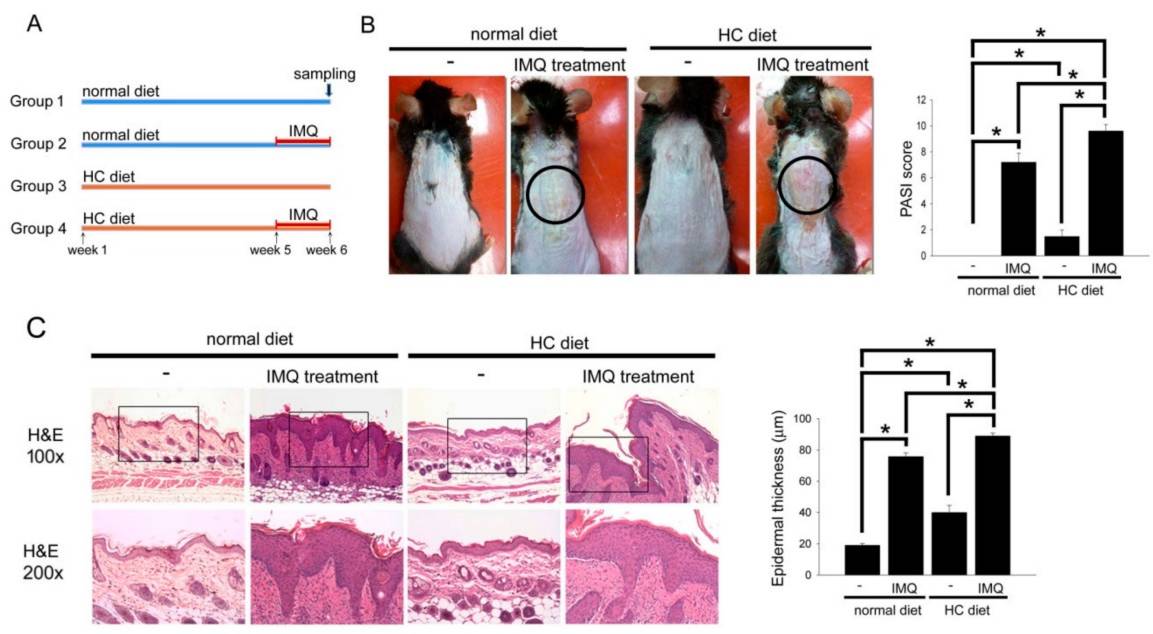Imiquimod (IMQ) induced Psoriasis Modeling & Pharmacodynamics Service
Creative Biolabs offers the most comprehensive animal model services for IMQ-induced psoriasis in mice. Particularly, not only robust, stably validated models are quickly obtained at reasonable prices, but other new models are tailored to meet your various needs.
What is psoriasis?
Psoriasis, a T-cell-mediated chronic inflammatory skin disorder, is characterized by skin thickening, inflamed plaques, and dry scales. It is considered as an immunological disease associated with histological changes such as increased vascularization of the skin, hyperplasia of epidermal keratinocytes, and leucocyte infiltration. However, as a multifactorial disease, the exact cellular and molecular mechanisms responsible for this condition have not been fully elucidated.
Animal models for psoriasis study
Investigators used to conduct research in the xenograft model, in which immunodeficient mice are transplanted with skin from a psoriasis patient. In recent years, more convenient and rapid models of psoriasis have been developed for pre-clinical studies on monkeys, mice, and rats. Among them, imiquimod (IMQ) induced psoriasis-like skin inflammation in mice model is considered to share lots of similarities with human psoriasis and is therefore consequently used to study the pathogenesis of inflammatory psoriasis, plus the development of novel therapeutic agents.
 Fig. 1 HC-diet aggravated the psoriasis-like phenomena and epidermis hyperplasia in IMQ-treated mice. 1
Fig. 1 HC-diet aggravated the psoriasis-like phenomena and epidermis hyperplasia in IMQ-treated mice. 1
IMQ-induced psoriasis rodent models
Imiquimod (IMQ), an immune activator and also a ligand of toll-like receptor (TLR) 7 and 8, is used for topical treatment of genital and perianal warts caused by human papillomavirus, as well as (pre)cancerous skin lesions such as superficial basal cell carcinoma. However, IMQ can exacerbate psoriasis at both the treated area, and distant skin sites. Application of IMQ on mouse skin results in the influx of various cells of the immune system, as well as hyperplasia of the epidermis, which is manifested as symptoms that closely resemble human psoriasis in terms of the phenotypic and histological characteristics. Moreover, the development of lesions is critically dependent on Il-23/IL-17. In summary, IMQ-induced skin inflammation in mice represents a useful model of human psoriasis.
Creative Biolabs provides assessments including but not limited to:
- Clinical Score/Ear Thickness
- PK/PD Blood Collections
- Cytokine/Chemokine Analysis
- Histopathologic Evaluation
- Immunohistochemistry
Meanwhile, in order to meet our customers' specific requirements and their various research objectives, Creative Biolabs also offers other rodent inflammatory & immunological disease models listed as follows that you may be interested in:
- Carrageenan Air Pouch Model
- Carrageenan-Induced Paw Edema Model
- Chemical-Induced Rodent Contact Hypersensitivity Model
- Passive Cutaneous Anaphylaxis (PCA) Model
- Delayed Type Hypersensitivity (DTH) Rodent Model
- Adjuvant-Induced Arthritis (AIA) Rodent Model
- Collagen-Induced Arthritis (CIA) Rodent Model
- Collagen Antibody-Induced Arthritis (CAIA) Model
- Cecum Ligation and Puncture (CLP)-Induced Sepsis Model
- LPS-Induced Rodent Sepsis Model
- Spontaneous Systemic Lupus Erythematosus (SLE) Mouse Models
- Induced Models of Systemic Lupus Erythematosus
Having talented experts and scientists who are specialized in inflammation model creation, model selection, and preclinical experiments, Creative Biolabs is proud to share our cutting-edge technology and extensive expertise to facilitate our clients' research and expand the value. Please feel free to inquiry us or just contact us directly if you are interested in any of these services.
Reference
- Shih, Chun-Ming et al. "Oxidized Low-Density Lipoprotein-Deteriorated Psoriasis Is Associated with the Upregulation of Lox-1 Receptor and Il-23 Expression In Vivo and In Vitro." International journal of molecular sciences vol. 19,9 2610. 3 Sep. 2018, doi:10.3390/ijms19092610. Distributed under Open Access license CC BY 4.0, without modification.
For Research Use Only.
